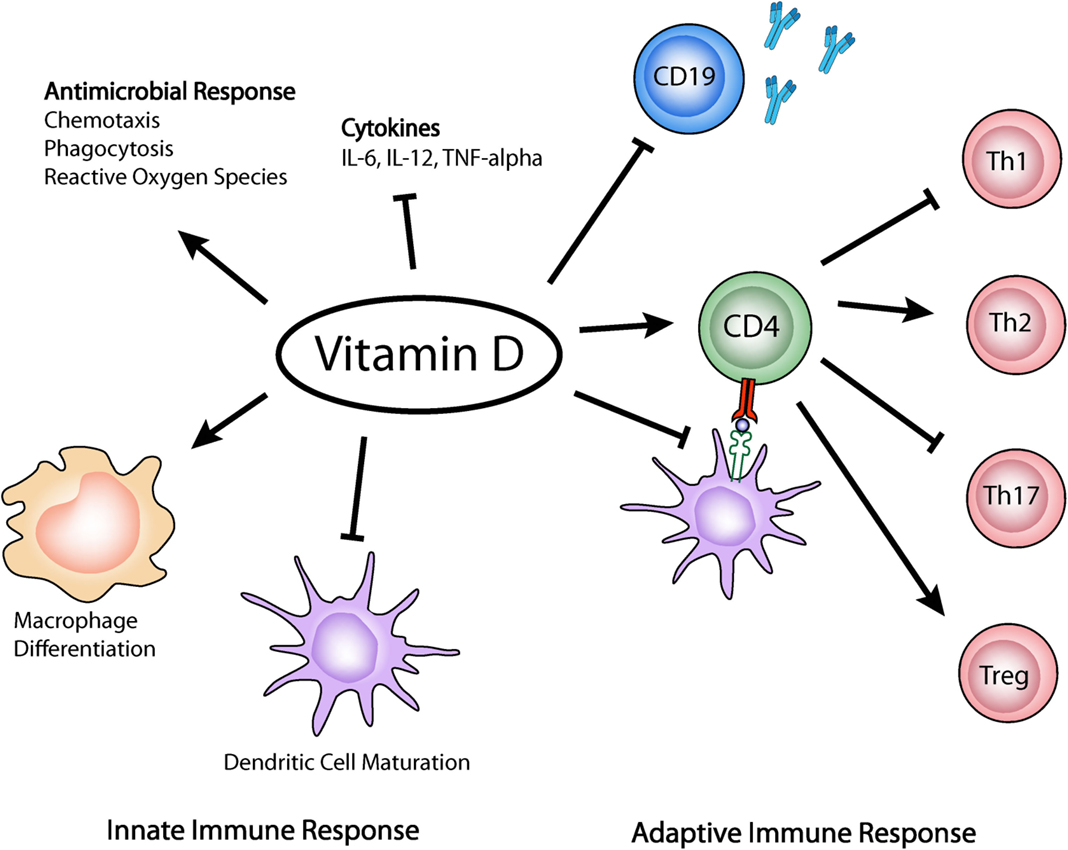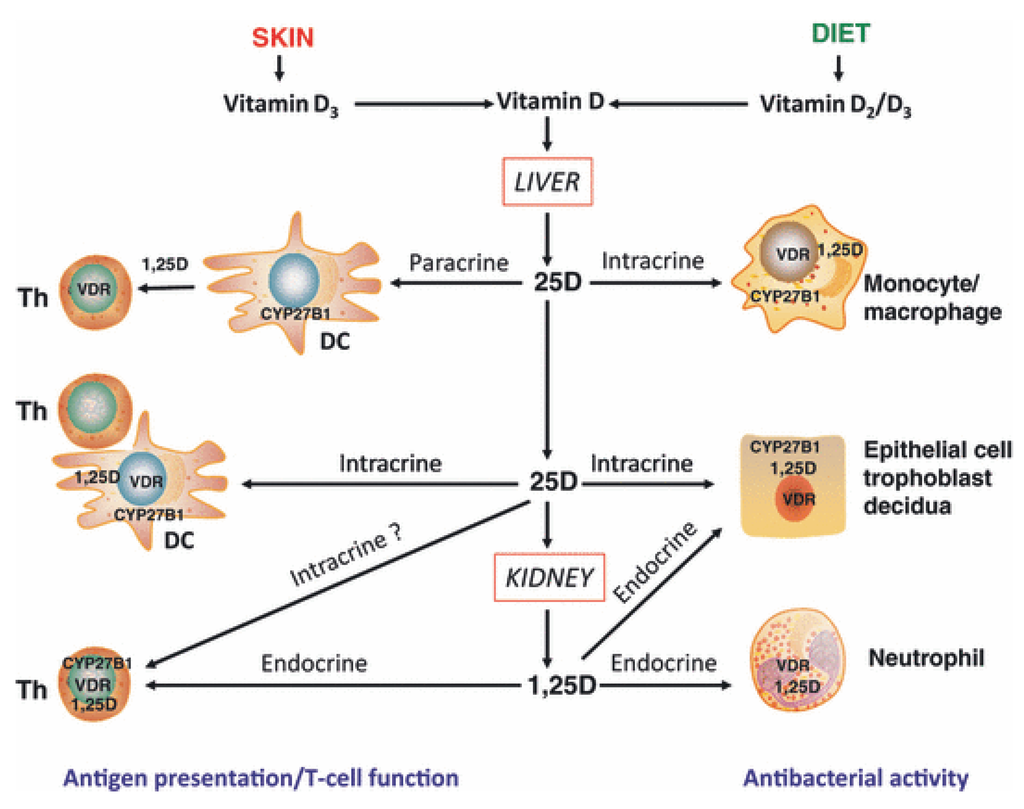Vitamin D & Immune System: The Science Explained | Health
Could a simple nutrient, often associated with strong bones, be the key to unlocking a stronger immune system? Emerging research strongly suggests that Vitamin D plays a far more complex and crucial role in our body's defense mechanisms than previously understood, extending its influence far beyond skeletal health.
For decades, Vitamin D has been lauded for its role in calcium regulation and bone health. However, the scientific landscape is rapidly shifting, revealing an intricate relationship between this essential vitamin and the immune system. Evidence is mounting that Vitamin D deficiency is not merely a matter of weakened bones; it's a potential vulnerability that can compromise the body's ability to fend off infections and regulate inflammation. The exploration of Vitamin D's impact on immune function is a burgeoning field, uncovering its multifaceted influence on both innate and adaptive immunity. It's a complex interplay, with implications that touch upon the very core of our health and resilience.
To understand the significance of this connection, let's delve deeper into the scientific evidence and the ongoing investigations. The study of Vitamin D's impact is not confined to a single laboratory or a single country; it's a global effort to decipher its profound implications.
- Go Youn Jung Unveiling The Rising Stars Journey Roles
- Hd Hub 4 U Know Before You Stream What You Need To Know
| Key Aspects of Vitamin D's Role in Immunity | |
|---|---|
| Immune System Modulation | Vitamin D influences both innate and adaptive immune responses. |
| Innate Immunity Support | It promotes the innate immune response, which provides the first line of defense against viral and bacterial infections. |
| Adaptive Immunity Impact | Vitamin D influences T-cell function, potentially shifting the balance of immune responses. |
| Inflammation Regulation | It plays a role in regulating inflammation. Recent findings link vitamin D deficiency with increased inflammation. |
| Association with Diseases | Studies reveal an inverse relationship between vitamin D status and increased incidence or aggravation of various diseases, including some autoimmune conditions. |
| Cellular Receptors | Vitamin D receptors (VDRs) are found on almost all cells of the immune system. |
| Metabolic Activation | The enzyme CYP27B1 in the airway epithelium and alveolar macrophages converts the precursor 25-hydroxyvitamin D into the active metabolite 1,25(OH)2D. |
| T-Cell Modulation | Promotes the shift from TH1 to TH2 function. |
Reference: National Center for Biotechnology Information (NCBI)
In vitro studies, conducted in laboratory settings, provide early insights into the mechanisms at play. These studies reveal that Vitamin D not only modulates innate immune cells, such as macrophages and dendritic cells, but also promotes a more "tolerogenic" immunological status. In simpler terms, Vitamin D seems to encourage the immune system to be less prone to overreacting, thereby potentially reducing the risk of autoimmune disorders and chronic inflammatory conditions.
Moving beyond laboratory settings, in vivo data, derived from animal studies and human supplementation trials, offers a more comprehensive picture. These real-world observations reinforce the findings from in vitro studies, often demonstrating that adequate Vitamin D levels are associated with enhanced immune function and decreased susceptibility to infections. These studies offer a more comprehensive picture, linking Vitamin D status with a variety of health outcomes.
- 2023 Kannada Movies Releases Reviews And Where To Watch
- Top Military Stocks To Watch Now 5starsstockscom Military
The airway epithelium and alveolar macrophages, key players in the respiratory system's defense mechanisms, possess the enzyme CYP27B1. This enzyme is crucial because it converts the precursor form of Vitamin D into its active metabolite, 1,25(OH)2D, also known as calcitriol. Furthermore, these cells also express the Vitamin D receptor (VDR), allowing them to respond directly to calcitriol. This localized production and responsiveness underscore the importance of Vitamin D in the respiratory system's frontline defense against pathogens.
The active metabolite of Vitamin D, 1,25(OH)2D3, wields its influence over a multitude of physiological processes, well beyond the traditional roles in calcium and phosphate regulation. This includes, crucially, the immune system. The immune system is a complex network, involving both the innate and adaptive arms, and both are responsive to 1,25(OH)2D3. The cells involved, in addition to expressing the VDR, also express enzymes involved in the metabolism of Vitamin D, further highlighting the intricate relationship between this vital nutrient and immune function.
The effects of Vitamin D extend to the adaptive immune system, encompassing lymphocytes like T cells and B cells. Through its active metabolite, Vitamin D exerts its influence on these cells, modulating their activity and responses. Specifically, Vitamin D promotes the shift from TH1 to TH2 function in T cells. Additionally, it inhibits the development of TH17 cells, which are crucial in combating certain pathogens but also linked to tissue damage and inflammation. Furthermore, Vitamin D influences Treg cells, which play a crucial role in immune suppression and tolerance.
The interplay between Vitamin D and the immune system is complex, with diverse effects on different immune cells. However, research has consistently demonstrated Vitamin D's supportive role in both innate and adaptive immunity. This suggests that Vitamin D acts as a crucial factor linking the two branches of immunity. Consequently, insufficient Vitamin D levels can compromise the normal function of both innate and adaptive immunity.
Recent epidemiological evidence has revealed a significant correlation between Vitamin D deficiency and an increased risk or exacerbation of various health conditions. These associations are not limited to the musculoskeletal system but extend to the immune system as well. Many studies have documented an inverse relationship between Vitamin D status and the incidence of infections, autoimmune diseases, and other conditions involving immune dysregulation. This inverse relationship supports the importance of Vitamin D in maintaining a healthy immune response.
It is now abundantly clear that Vitamin D's significance extends far beyond its traditional roles in calcium regulation and bone health. The discovery of Vitamin D receptors in virtually every cell of the immune system underscored the profound role of Vitamin D in immune function. The ability of immune cells to actively metabolize Vitamin D precursors further highlights the intimate relationship between Vitamin D and the body's defense mechanisms.
Systemic inflammation, a hallmark of many chronic diseases, has been linked to Vitamin D deficiency. The reversal of systemic inflammation through adequate Vitamin D intake may also slow the formation of atheromas and reduce the risk of cardiovascular disease (CAD). Vitamin Ds influence on inflammation is a promising avenue for preventative and therapeutic strategies.
Vitamin D plays an active role in a vast range of physiological processes that reach far beyond the realm of mineral metabolism and skeletal health. Its ability to regulate the immune system is a well-recognized extraskeletal action. The findings of various studies confirm that Vitamin D is essential for not just bones and teeth but also the immune system, brain health, and the regulation of inflammation. The evidence overwhelmingly suggests that Vitamin D is a multifaceted nutrient crucial for overall health and well-being.
The body's capacity to produce Vitamin D in response to sunlight exposure is a fundamental aspect of its role in health. This natural mechanism highlights the significance of adequate sun exposure, and in regions with limited sunlight, supplementation becomes an important consideration.
Research consistently demonstrates the vital role Vitamin D plays in immune function. A deficiency in Vitamin D has been shown to increase susceptibility to infection, highlighting the importance of maintaining optimal levels. Moreover, studies have revealed an association between Vitamin D deficiency and an increased incidence or aggravation of various health conditions, solidifying its role as a key factor in immune system modulation.
It is through the discovery that antigen-presenting cells, such as macrophages, can actively convert precursor 25-hydroxyvitamin D (25D) into the active form 1,25-dihydroxyvitamin D (1,25D) that a deeper understanding has emerged. This metabolic process, occurring within the immune system itself, underscores the profound influence of Vitamin D on immune function.
Although the influence of Vitamin D on immunity has been acknowledged for many years, recent studies have provided deeper insight into its effects on both innate and adaptive immune function. These studies emphasize that Vitamin D plays a central role in maintaining normal immune function, ensuring that our bodies are well-equipped to defend against pathogens and regulate inflammation effectively.



Detail Author:
- Name : Floyd Wolff
- Username : torp.retta
- Email : rwilliamson@hotmail.com
- Birthdate : 1992-11-30
- Address : 82866 Ondricka Lock Kuphalburgh, LA 78190-7569
- Phone : 1-417-404-3092
- Company : Goodwin LLC
- Job : Locomotive Firer
- Bio : Laborum similique a odio voluptates blanditiis enim expedita. Vel et saepe cupiditate veritatis est. In alias culpa aut qui et est.
Socials
instagram:
- url : https://instagram.com/upton1972
- username : upton1972
- bio : Rerum velit quidem mollitia sunt. Et modi provident et dolorum eum. Ad fuga rerum eaque.
- followers : 6947
- following : 1655
twitter:
- url : https://twitter.com/upton2020
- username : upton2020
- bio : Consequatur aliquam dolores est est. Maiores numquam enim aspernatur quia commodi odio.
- followers : 1003
- following : 493